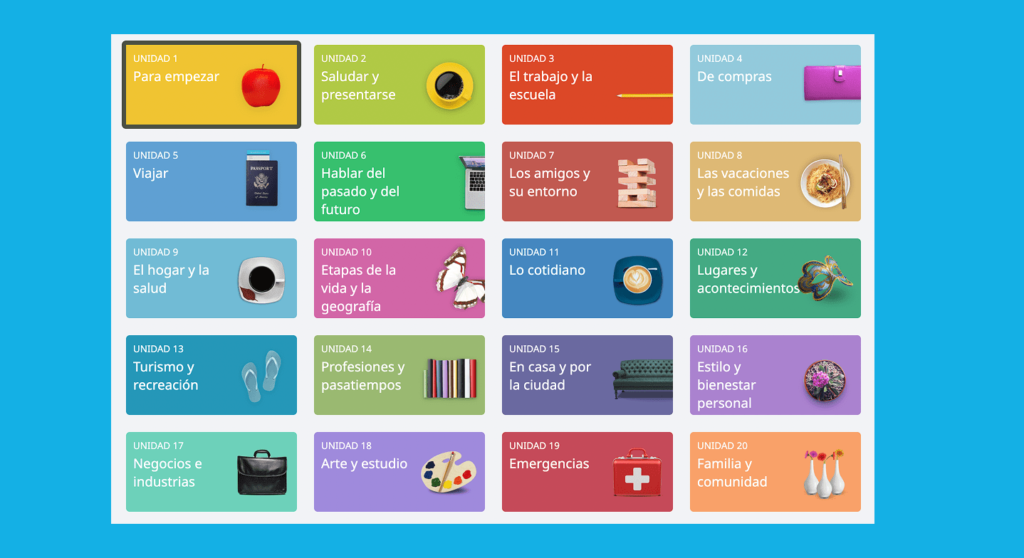If you’re asking yourself whether Rosetta Stone is worth it, you’re in good company. I gave it a try to find out firsthand. Here are my two cents from learning Spanish through this program — a straightforward Rosetta Stone review to help you figure out if it’s worth your penny.
Quick Summary

1. What is Rosetta Stone?
Rosetta Stone is one of the oldest and most well-known language-learning programs out there. It’s been around for decades, and today it’s mostly an app and online platform that helps you pick up a new language through pictures, sounds, and speaking practice.
The idea is to teach you naturally, kind of like how you learned your first language—without translations or grammar rules thrown at you right away. Instead, you connect words with images and repeat what you hear to build your skills gradually.
2. How its lessons work?
Rosetta Stone structures each lesson to help you learn naturally and gradually, step by step. Lessons usually take 5 to 10 minutes, it goes something like this:
- Introduction of new words: You’re first introduced to a few new words or phrases.
- Listening and repeating: The app reads the words or sentences out loud for you to listen and repeat.
- Images with words: You see pictures that visually represent the words to help you connect meaning without translation.
- Identify the right image: You’re shown multiple pictures and asked to select the one that matches the spoken word or phrase.
- Use the word: You get exercises where you have to use the right word or phrase to describe a picture.
- Speaking practice: Throughout, you speak aloud, and the app checks your pronunciation with its speech recognition.
- Repetition: This cycle repeats, gradually building your vocabulary and understanding by reinforcing the words with images and speech.
It’s designed to mimic the way you learned your first language—slowly building understanding through context, images, and sound rather than grammar rules or translations.
3. Pricing
| 3-Month Plan | €59.85 total (€19.95 per month) |
| 12-Month Plan | €126 total (€10.50 per month) |
| Lifetime Subscription | Regularly priced at €399, but often discounted to around €199 |
Want to see if it works for you? Try Rosetta Stone’s free trial and get a feel for it yourself.
What I Like About Rosetta Stone
1. Simple, Predictable, and Easy to Use
I like how simple and minimal the interface is—it doesn’t overwhelm you with buttons or options, so moving through the lessons feels natural and easy. Everything is laid out clearly, so you don’t waste time figuring out where to click or what to do next. Plus, the lessons follow the same rhythm every time: you’re introduced to new words or phrases, you listen and repeat, then you match pictures to words, and so on. Because of that predictable flow, it’s easy to get into a steady groove where you can focus on really understanding the language instead of getting distracted or confused about what comes next.
2. Short Lessons
Rosetta Stone lessons are short and to the point—usually around 5 to 10 minutes each. That makes it easy for me to fit a lesson into my day, even when I only have a few minutes to spare. Since the lessons are bite-sized, I don’t feel overwhelmed or burned out; in fact, I often find myself finishing more lessons. Plus, the short length helps me stay focused and get the most out of each session without zoning out.
3. Practice Speaking, Not Just Tapping
Yes, Rosetta Stone helps you practice speaking—you’re not just listening or reading silently. The app gets you to say words and phrases out loud, so you actually use what you’re learning by speaking it. It uses voice recognition to check how you’re doing. So instead of just tapping or sitting in front of your screen, you’re actively improving your speaking skills right away, which to me is the most important skill to practice when learning a new language.
4. Offline Learning Made Easy
I always like to disconnect from the internet every now and then, and I appreciate that Rosetta Stone lets me do that. You can download lessons and keep learning even when you’re offline, which is great if you’re traveling or just want a break from being connected all the time.
What I Don´t Like About Rosetta Stone
1. Not Very Engaging
Yes, I like that Rosetta Stone is simple, but it feels too plain. There’s no gamification—no points, no levels, no little rewards to keep you going. It doesn’t really grab my attention or make me want to keep clicking through. For me, that makes it easier to lose interest, especially on days when I’m not super motivated.
2. No Grammar Explanations
This is the biggest letdown for me. I feel like I’m just mimicking phrases without really understanding how the language works. There are no grammar tips, no breakdowns—just examples. So even if I get something right, I can’t explain why. That makes it hard to build real confidence, especially when trying to speak on my own.
3. Speech Recognition
One thing that can get frustrating is its voice recognition. It’s great that the app asks you to speak out loud, but sometimes it misjudges what I say—especially if I speak quickly or even naturally, like how you’d talk in real life. You could be pronouncing it correctly, but if it doesn’t match the app’s expectations exactly, it marks it wrong. This feels really discouraging personally, especially when I feel like I´m making progress but the app doesn’t pick up on it.
4. Only Teaches Up to A2 Level
Rosetta Stone does a solid job for beginners, but it only takes you so far—usually up to an A2 level, which is basic or elementary. That means you’ll learn common phrases and simple conversations, but it doesn’t go deep into more complex grammar, vocabulary, or advanced speaking skills. If your goal is fluency or to have detailed conversations, Rosetta Stone won’t get you there.
5. Progress Tracking Is Minimal
Another thing I don’t love is how basic the progress tracking is. There’s no clear way to see how much I´ve actually improved or what areas I need to work on. It just shows what lessons I´ve done, but not my strengths or weaknesses. I’m putting time and effort into learning Spanish, and it’s a good motivation when I know that I’m improving. But if I don’t see that progress, it feels like it’s just a waste of time.
6. Price Feels High for What You Get
For what Rosetta Stone offers, I think it’s pricey. The lessons are simple and don’t go beyond basic levels, and some features—like grammar explanations and progress tracking—are pretty limited. So, while it’s solid for beginners, I expect a bit more value for the cost.
7. Artificial Phrases
Some of the sentences are cringy and unnatural—like “This animal is from China. It does not speak Chinese” (but written in Spanish, of course). Phrases like these made the lessons feel less real and harder to connect with everyday language. This kind of stuff doesn’t help me feel like I’m actually learning how Spanish people really talk.
Is Rosetta Stone Worth It?
Rosetta Stone is good for beginners because it focuses on the basics—from A1 to A2 level—and right from the start, it gets you speaking. That’s something many other apps don’t do as well. But here’s the catch: it doesn’t explain grammar. Without understanding how the language works, it’s harder to build your own sentences, especially for adults like me who can’t pick up a language as naturally as kids do.
Ever wondered why kids pick up languages so easily while adults struggle? This blog breaks down the science—and how you can still succeed.
If you’re patient and good at managing your own study time, this app can work. But for me, it’s not very motivating—it’s just too plain and not designed to keep you hooked. So if you need something with more energy or encouragement, Rosetta Stone might not be the best fit.
Quick Answer: Honestly, for the price and how basic the lessons are, you can definitely get more value from other apps. If you want simple speaking practice and a clean interface, it’s fine. But if you’re looking for more features, grammar help, and something that engages you more, there are far way better options out there.
Are you learning Spanish? Check out this free app I’ve been using to learn Spanish. It’s one of several I’ve tried, and honestly, it’s been super helpful—without costing a thing.
Rosetta Stone Review: Pros and Cons
Pros
- Minimal and easy-to-navigate interface
- Lessons are short and fit easily into any schedule
- Actively practices your speaking with voice recognition
- Allows offline learning by downloading lessons
Cons
- Too plain and not motivating without gamification
- No grammar explanations to understand language rules
- Voice recognition sometimes misjudges natural speech
- Only covers beginner to elementary (A2) level
- Progress tracking doesn’t show how much you improve
- Price feels high for mostly basic lessons
- Some example sentences feel unnatural and awkward



